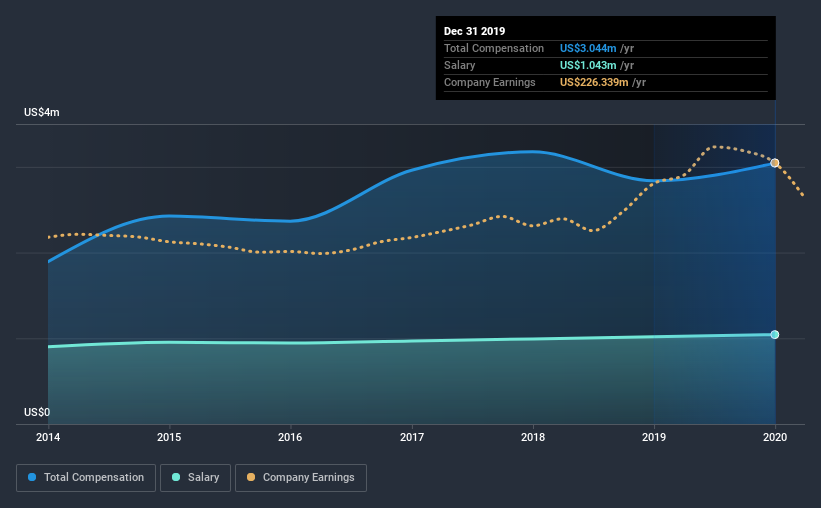What We Learned About Fulton Financial's (NASDAQ:FULT) CEO Pay

Want to participate in a short research study? Help shape the future of investing tools and earn a $40 gift card!
This article will reflect on the compensation paid to Phil Wenger who has served as CEO of Fulton Financial Corporation (NASDAQ:FULT) since 2013. This analysis will also assess whether Fulton Financial pays its CEO appropriately, considering recent earnings growth and total shareholder returns.
Check out our latest analysis for Fulton Financial
How Does Total Compensation For Phil Wenger Compare With Other Companies In The Industry?
Our data indicates that Fulton Financial Corporation has a market capitalization of US$1.6b, and total annual CEO compensation was reported as US$3.0m for the year to December 2019. That's a fairly small increase of 7.3% over the previous year. While this analysis focuses on total compensation, it's worth acknowledging that the salary portion is lower, valued at US$1.0m.
For comparison, other companies in the same industry with market capitalizations ranging between US$1.0b and US$3.2b had a median total CEO compensation of US$3.6m. This suggests that Fulton Financial remunerates its CEO largely in line with the industry average. Moreover, Phil Wenger also holds US$3.9m worth of Fulton Financial stock directly under their own name, which reveals to us that they have a significant personal stake in the company.
Component | 2019 | 2018 | Proportion (2019) |
Salary | US$1.0m | US$1.0m | 34% |
Other | US$2.0m | US$1.8m | 66% |
Total Compensation | US$3.0m | US$2.8m | 100% |
Speaking on an industry level, nearly 43% of total compensation represents salary, while the remainder of 57% is other remuneration. Fulton Financial pays a modest slice of remuneration through salary, as compared to the broader industry. If non-salary compensation dominates total pay, it's an indicator that the executive's salary is tied to company performance.
A Look at Fulton Financial Corporation's Growth Numbers
Fulton Financial Corporation's earnings per share (EPS) grew 7.2% per year over the last three years. In the last year, its revenue is up 1.6%.
We'd prefer higher revenue growth, but the modest improvement in EPS is good. It's clear the performance has been quite decent, but it it falls short of outstanding,based on this information. Moving away from current form for a second, it could be important to check this free visual depiction of what analysts expect for the future.
Has Fulton Financial Corporation Been A Good Investment?
With a three year total loss of 42% for the shareholders, Fulton Financial Corporation would certainly have some dissatisfied shareholders. Therefore, it might be upsetting for shareholders if the CEO were paid generously.
To Conclude...
As we noted earlier, Fulton Financial pays its CEO in line with similar-sized companies belonging to the same industry. But with negative shareholder returns and unimpressive earnings growth, shareholders will surely be disturbed. Although we wouldn't say CEO compensation is exceptionally high, it isn't very low either. Shareholders might want to see substantial improvements in returns before agreeing that Phil deserves a raise.
It is always advisable to analyse CEO pay, along with performing a thorough analysis of the company's key performance areas. That's why we did our research, and identified 2 warning signs for Fulton Financial (of which 1 is a bit unpleasant!) that you should know about in order to have a holistic understanding of the stock.
Important note: Fulton Financial is an exciting stock, but we understand investors may be looking for an unencumbered balance sheet and blockbuster returns. You might find something better in this list of interesting companies with high ROE and low debt.
This article by Simply Wall St is general in nature. It does not constitute a recommendation to buy or sell any stock, and does not take account of your objectives, or your financial situation. We aim to bring you long-term focused analysis driven by fundamental data. Note that our analysis may not factor in the latest price-sensitive company announcements or qualitative material. Simply Wall St has no position in any stocks mentioned.
Have feedback on this article? Concerned about the content? Get in touch with us directly. Alternatively, email editorial-team@simplywallst.com.

